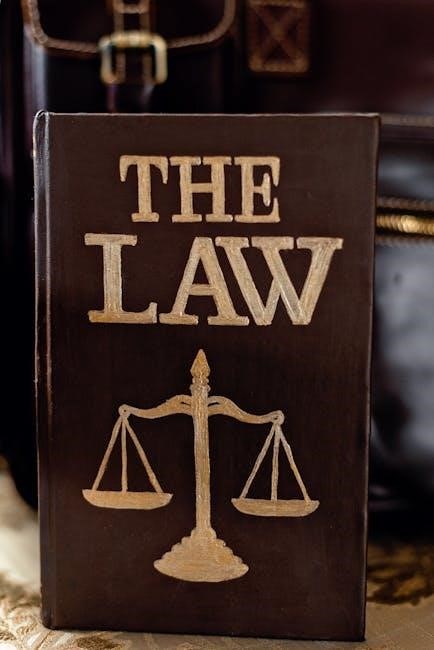
“The Rules Book PDF” explores the significance of rules in shaping societal norms‚ personal growth‚ and professional success‚ offering insights into their psychological and practical dimensions․
1․1 Overview of the Book
“The Rules Book PDF” is a comprehensive guide that delves into the essence of rules and their impact on various aspects of life․ It explores how rules shape societal norms‚ personal growth‚ and professional success․ The book examines the psychological foundations of rule-making‚ offering insights into why humans create and adhere to rules․ It also discusses the practical applications of rules in daily life‚ providing strategies for effective implementation․ By blending theory with real-world examples‚ the book serves as a valuable resource for understanding the role of rules in both individual and collective contexts․ Its structured approach makes it accessible to readers seeking to navigate the complexities of rule-based systems․
1․2 Importance of Understanding the Rules
Understanding the rules is essential for navigating both personal and professional environments effectively․ Rules provide structure‚ ensuring fairness and consistency in decision-making․ They help individuals avoid conflicts and penalties‚ fostering a sense of accountability․ In professional settings‚ adhering to rules enhances credibility and trustworthiness․ The internet highlights how rules like HTTP status codes (e․g․‚ 403 Forbidden) govern access‚ while DFM (Design for Manufacture) analysis relies on rules to optimize production․ By grasping these principles‚ individuals can make informed choices‚ aligning their actions with societal and organizational expectations․ This understanding not only promotes efficiency but also supports long-term success and harmony in various spheres of life․
Key Themes in “The Rules Book PDF”
The book explores societal norms‚ personal growth‚ and professional success through rules‚ highlighting their psychological impact and practical applications in various contexts․
2․1 The Concept of Rules in Society
Rules are essential for maintaining order and structure in society‚ enabling cooperation and stability among individuals and groups․ They establish boundaries and expectations‚ guiding behavior to ensure collective well-being․ From legal frameworks to social norms‚ rules are created and enforced by institutions to promote fairness and accountability․ While rules provide a sense of security‚ they can also be restrictive‚ sparking debates about individual freedom versus societal needs․ Understanding the concept of rules in society helps individuals navigate their roles within communities‚ fostering respect for shared values and mutual responsibilities․ This foundation is crucial for building harmonious and functional societies․
2․2 Personal and Professional Rules
Personal and professional rules serve as guidelines for individuals to navigate their lives effectively․ Personal rules help establish boundaries‚ prioritize goals‚ and maintain discipline‚ while professional rules ensure accountability‚ respect‚ and success in the workplace․ These rules often align with societal norms but are tailored to individual or organizational needs․ They foster productivity‚ ethical behavior‚ and consistency‚ enabling individuals to achieve their objectives while maintaining integrity․ Understanding and adhering to these rules is crucial for personal growth and career advancement‚ as they provide a framework for decision-making and behavior․ Balancing personal freedom with structured guidelines ensures harmony in both personal and professional spheres․
2․3 The Psychology Behind Rule-Making
The psychology behind rule-making reveals how humans create structures to bring order to chaos․ Rules provide a sense of control‚ reducing uncertainty and anxiety․ They are rooted in societal norms‚ personal values‚ and cultural beliefs‚ shaping behavior and decision-making․ Rule-making also reflects cognitive biases‚ as individuals often create rules that align with their perceptions of fairness and justice․ Additionally‚ rules serve as a tool for social cohesion‚ fostering cooperation and mutual understanding․ The process of rule-making is deeply tied to human psychology‚ addressing the need for predictability and stability in both personal and collective contexts․ This psychological foundation underpins the effectiveness of rules in guiding behavior․

Practical Applications of the Rules
Rules enhance efficiency in manufacturing‚ web security‚ and sports‚ guiding decision-making and ensuring compliance‚ as seen in DFM analysis‚ HTTP protocols‚ and racing strategies․
3․1 How to Apply the Rules in Daily Life
Rules structure daily life‚ from HTTP status codes guiding web access to DFM analysis optimizing manufacturing․ Understanding these frameworks enhances efficiency and decision-making․ For instance‚ recognizing a 403 Forbidden error helps troubleshoot website access issues‚ while applying Rule 34 in online communities sets boundaries for content sharing․ These examples illustrate how rules‚ whether technical or social‚ provide clear guidelines for navigating various aspects of life‚ ensuring smoother interactions and problem-solving․ By integrating these principles‚ individuals can better align their actions with established norms‚ fostering productivity and harmony in both personal and professional spheres․
3․2 Case Studies of Successful Rule Implementation
Case studies highlight how rules drive success in various domains․ For instance‚ HTTP status codes like 403 Forbidden ensure clear web access protocols‚ while DFM analysis optimizes manufacturing processes․ Rule 34 in online communities sets boundaries for content sharing‚ preventing misuse․ Gaming platforms use rules to ensure fair play‚ as seen in F1’s “papaya rules‚” which prioritize team strategy over individual gains․ These examples demonstrate how well-defined rules enhance efficiency‚ consistency‚ and problem-solving․ By studying these cases‚ individuals and organizations can adopt similar frameworks to streamline operations and achieve their goals effectively‚ showcasing the practical value of rule-based systems in real-world applications․

The Role of Rules in Different Industries
Rules govern industries like tech‚ manufacturing‚ and gaming‚ ensuring efficiency and fairness․ HTTP status codes‚ DFM analysis‚ and gaming regulations exemplify how rules optimize operations and decision-making․
4․1 Rules in Business and Management
Rules in business and management are essential for maintaining efficiency and stability․ From DFM analysis optimizing production to driver management enhancing performance‚ these guidelines ensure smooth operations․ They streamline processes‚ reduce costs‚ and promote consistency‚ fostering a productive environment․ By adhering to these rules‚ businesses can enhance decision-making and achieve long-term success‚ as outlined in “The Rules Book PDF․”
4․2 Rules in Sports and Gaming
Rules in sports and gaming are crucial for ensuring fair play and maintaining order․ From Formula 1’s “papaya rules” to online gaming’s Rule 34‚ these guidelines dictate behavior and outcomes․ They promote sportsmanship‚ safety‚ and strategic thinking‚ fostering healthy competition․ In esports‚ rules prevent cheating and ensure a level playing field‚ while in traditional sports‚ they protect athletes and maintain the integrity of the game․ By adhering to these rules‚ participants can fully engage in the activity‚ knowing the boundaries and expectations․ “The Rules Book PDF” highlights how these rules evolve to meet new challenges‚ ensuring their relevance in dynamic environments․
4․3 Rules in Technology and Software Development
Rules in technology and software development are essential for ensuring functionality‚ security‚ and compatibility․ From HTTP status codes like 403 Forbidden to design principles like DFM (Design for Manufacture)‚ these guidelines streamline processes․ In software development‚ rules govern versioning‚ such as distinguishing between studio and game-ready drivers‚ ensuring stability and performance; They also dictate how to manage bundled installations‚ like removing unwanted programs․ By following these rules‚ developers create efficient‚ scalable‚ and user-friendly systems․ “The Rules Book PDF” examines how these rules adapt to emerging challenges‚ ensuring technological advancements remain aligned with user needs and industry standards․
The Evolution of Rules Over Time
The evolution of rules traces their historical roots and modern reinterpretations‚ adapting to societal changes and technological advancements‚ ensuring order in expanding domains․

5․1 Historical Development of Rules
Rules have evolved significantly over time‚ from ancient legal codes to modern societal norms․ Early civilizations established laws to maintain order‚ with examples like the Code of Hammurabi and Roman law laying foundational principles․ The Middle Ages saw the rise of religious and feudal rules‚ shaping governance and social hierarchies․ The Enlightenment brought rational approaches‚ emphasizing reason and individual rights․ The 19th and 20th centuries introduced industrial and technological rules‚ adapting to new challenges․ Today‚ rules continue to evolve‚ influenced by globalization‚ digitalization‚ and shifting cultural values․ This historical journey highlights how rules adapt to societal needs‚ ensuring relevance and effectiveness across generations․
5․2 Modern Interpretations of Traditional Rules
Modern interpretations of traditional rules reflect evolving societal values and technological advancements․ For instance‚ the concept of “Rule 34” in internet culture highlights how traditional norms adapt to digital spaces․ Similarly‚ industries like gaming and sports reinterpret rules to enhance fairness and performance․ In technology‚ rules like HTTP status codes (e․g․‚ 403 Forbidden) maintain order in digital interactions․ Traditional manufacturing rules‚ such as DFM (Design for Manufacture)‚ are refined for modern production efficiency․ These reinterpretations demonstrate how rules remain relevant by adapting to new challenges and opportunities‚ ensuring their continued effectiveness in a rapidly changing world while preserving their core purpose of establishing order and guidance․
The Impact of Rules on Individual Freedom

Rules protect societal order but can restrict individual freedom‚ necessitating a balance to ensure personal liberty while maintaining collective security and fairness in diverse modern contexts․
6․1 Balancing Rules and Personal Liberty
Rules are essential for societal order‚ but they can sometimes infringe on individual freedom․ Striking a balance is crucial to ensure personal liberty while maintaining collective security․ Rules protect rights and ensure fairness‚ but excessive regulation can stifle creativity and autonomy․ For instance‚ in gaming‚ rules like “papaya rules” ensure fair play but may limit strategic creativity․ Similarly‚ HTTP status codes like 403 maintain order but restrict access․ The key is to design rules that adapt to changing contexts‚ respecting individuality while preserving societal harmony․ This balance ensures that rules serve as guardians of freedom rather than barriers to personal expression and growth․

6․2 The Consequences of Breaking Rules
Breaking rules can lead to severe consequences‚ ranging from social exclusion to legal penalties․ In gaming‚ violating “papaya rules” may result in disqualification or penalties‚ as seen in Formula 1․ Similarly‚ accessing restricted websites can trigger HTTP 403 errors‚ denying access․ Ignoring DFM principles in manufacturing can lead to production inefficiencies․ In personal contexts‚ rule-breaking may damage trust or relationships․ Consequences often aim to maintain order and fairness‚ ensuring rules are respected․ Understanding these outcomes highlights the importance of adherence and the potential costs of noncompliance in various spheres of life‚ from professional settings to online interactions and societal norms․

The Future of Rules in a Changing World
The future of rules involves adapting to new challenges and leveraging technology to create flexible frameworks that guide societal evolution while maintaining order and innovation․
7․1 Adapting Rules to New Challenges
As the world evolves‚ rules must adapt to address emerging challenges․ Technological advancements‚ societal shifts‚ and global interconnectedness demand flexible frameworks․ The internet highlights how HTTP status codes like 403 reflect access restrictions‚ while concepts like DFM (Design for Manufacture) show rule applications in manufacturing․ Rule 34 illustrates how rules evolve in digital spaces․ Adapting rules ensures relevance‚ balancing innovation with stability․ This section explores how rules can be refined to meet modern demands‚ maintaining order while fostering progress in areas like cybersecurity‚ AI‚ and social norms․ The ability to adapt rules is crucial for navigating future complexities effectively․
7․2 The Role of Rules in Shaping Tomorrow’s Society
Rules play a pivotal role in shaping the future of society by providing a foundation for stability and innovation․ As technology advances and societal norms evolve‚ rules must guide ethical considerations and ensure equitable progress․ The internet highlights how rules like HTTP status codes govern digital interactions‚ while concepts like DFM (Design for Manufacture) demonstrate their application in innovation․ Rule 34‚ a digital-age phenomenon‚ shows how rules adapt to new contexts․ By establishing clear frameworks‚ rules will continue to steer societal development‚ balancing individual freedoms with collective well-being․ Their adaptability ensures they remain relevant‚ fostering a structured yet dynamic path for tomorrow’s world․
“The Rules Book PDF” emphasizes the essential role of rules in providing structure and guiding behavior‚ ensuring adaptability to new challenges for a balanced‚ progressive society․

8․1 Summary of Key Points
“The Rules Book PDF” highlights the foundational role of rules in society‚ personal growth‚ and professional success․ It explores their psychological underpinnings‚ practical applications‚ and evolution over time․ The book emphasizes how rules provide structure‚ ensure fairness‚ and adapt to changing challenges․ By examining rules in various industries like business‚ sports‚ and technology‚ it illustrates their universal relevance․ The text also addresses the balance between rules and individual freedom‚ underscoring their impact on shaping future societies․ Through case studies and real-world examples‚ the book offers a comprehensive understanding of how rules influence human behavior and societal progress‚ making it a valuable resource for personal and professional development․
8․2 Final Thoughts on the Importance of Rules
Rules are the backbone of a structured and functioning society‚ providing clarity‚ consistency‚ and fairness․ They guide individual and collective behavior‚ ensuring harmony and progress․ While rules may sometimes feel restrictive‚ they are essential for maintaining order and enabling freedom within defined boundaries․ The ability to adapt rules to changing circumstances ensures their relevance and effectiveness․ Ultimately‚ rules are not mere constraints but a foundation for growth‚ innovation‚ and societal advancement․ By understanding and respecting rules‚ individuals and communities can thrive‚ creating a balanced and prosperous world for future generations․

Additional Resources
Explore recommended readings and online forums for deeper insights into rule implementation and discussions on societal norms and personal growth‚ staying updated and engaged․

9․1 Recommended Reading
For further exploration‚ consider books like “Atomic Habits” by James Clear‚ which delves into rule-based systems for personal growth‚ and “The Power of Habit” by Charles Duhigg‚ exploring how rules shape behaviors․ Additionally‚ “Mindset: The New Psychology of Success” by Carol S․ Dweck offers insights into rule-making in personal and professional contexts․ These resources complement “The Rules Book PDF” by providing practical and psychological perspectives on rule implementation and their impact on individual and societal levels‚ ensuring a well-rounded understanding of the subject matter․
9․2 Online Communities and Forums
Engage with online communities like Reddit’s r/Rule34 or GitHub forums to discuss rule implementation and share insights․ These platforms offer diverse perspectives and real-world applications of rule-based systems․ For tech enthusiasts‚ forums like Stack Overflow provide discussions on coding rules and software development․ Additionally‚ join specialized groups on LinkedIn or Discord focused on rule-making in business and gaming․ These communities foster collaboration and learning‚ helping you apply the principles from “The Rules Book PDF” effectively․ Participate in discussions‚ ask questions‚ and gain practical advice from experts and peers worldwide․